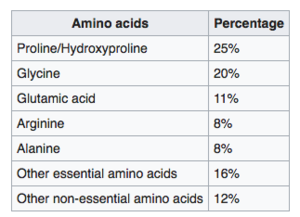Why Women Need Collagen

Appearance-wise, what do many women worry about after having babies?
Stretch marks, lingering "mommy tummy," and loose skin.
Health-wise, what do most modern women experience at one time or another?
Inflamed guts, digestive disturbances, stress, low energy, weight management issues, and stiff and/or painful joints.
How about issues associated with aging, such as wrinkles, brittle hair and nails, sagging skin, and sagging organs (i.e. pelvic organ prolapse)?
Have any of these ever been a problem for YOU or for someone you love?
I'd be a charlatan if I were to claim that I have a "magical cure" for all of these concerns. However, I can tell you that I have a TOOL that may help. It's collagen. Our bodies rely on collagen to support healthy hair, skin, and nails, improve bone and joint health, and aid in digestion. From our muscles to our joints and everything in between, maintaining our collagen production is essential for overall health and wellness.
NOTE: I created an at-home program that is perfect for people with prolapse or bladder leakage. Only 10-15 minutes a day will help you reduce (or even reverse) symptoms and learn how to love life again with prolapse. Join me in my Lift Program!
Love life again with lift!
What is Collagen?
Collagen is a form of protein found in the "gristle" of meat products as well as in skin and organ meats. Collagen contains the amino acids glycine, proline, hydroxyproline, and arginine which provide some amazing healing abilities that touch the whole body (as I'm about to share).

Our ancestors didn't have problems getting collagen, as it was commonly ingested when families ate the ENTIRE animal. But with the introduction of modern food processing (and our instinct to strip meats of skin, bones, and connective tissues before eating), we’ve nearly eliminated all forms of collagen that were once abundant, and so for us, supplementing our diet with a clean form of this vital nutrient is a smart move.
It's all about Balance
Here's the deal: When we primarily eat muscle meat (i.e. boneless, skinless chicken breasts) which is heavier in certain amino acids such as tryptophan, leucine, and methionine, we're not getting a COMPLETE amino acid profile. We need to add back in the collagen so we can bump up our intake of amino acids such as proline and glycine (see table above)!

Don’t our bodies already produce collagen?
Well...they do! But as we get older – somewhere around the time we hit 25 (not very old!!!) – the amount we produce begins to decline, leading to less moisture and elasticity in our skin, nails and hair that appear frail and brittle, and joints and bones with less strength and flexibility.
Women may particularly notice this loss of elasticity after pregnancy and childbirth, which – due to the (unfortunate?! cruel?!) irony of nature – tends to occur around the time that collagen production declines.
Because of this decline in production, it’s important to ensure we’re getting additional collagen in our diets. Unless you're eating almost every part of an animal – skin, gristle, and organs included – you're probably not getting enough.
Collagen Benefits
Let's break down the benefits that collagen supplementation can provide:
-
Promotes Healthy Hair, Skin, and Nails
Since collagen is the most abundant protein in the human body, it’s responsible for plumping up your tissues, supporting skin elasticity and healthy hair + nails. As little as one serving a day can make a significant impact on how you look and feel. Just as plants rely on regular watering to grow, our bodies rely on consistent collagen intake to keep our hair and nails growing strong and long.
-
It's a Boon for Surgery and Healing
If you've sustained an injury (i.e. an accident, a birth-related injury, or even internal trauma such as a hernia or ulcer) or if you've recently undergone surgery, then collagen supplementation may be helpful for you. Your body needs nourishment and the full spectrum of amino acids to heal. -
Anti-Aging
Glycine (one of the amino acids in collagen) helps form glutathione, an antioxidant that prevents cellular damage and various signs of aging. A 2011 study published in the American Journal of Clinical Nutrition found that glutathione deficiency in elderly people occurs because of a marked reduction in synthesis. However, supplementation with the glutathione precursors cysteine and glycine can restore glutathione synthesis and concentration, thereby lowering levels of oxidative stress. Less oxidative stress = less oxidant damage! In addition, glycine is anti-inflammatory, which is KEY since inflammation is linked to numerous chronic conditions that plague us as we age. Glycine also promotes easy sleep to help you get your beauty rest.
-
Supports Bone and Joint Health
Ancient wisdom says to “eat what ails you," and in the case of gelatin and collagen, it holds true: eating gelatin derived from the skin and bones of animals can help your own skin, bone, and joint health. Collagen has been shown to improve joint health as a result of its gel consistency and ability to support ligament and tendon health. This study indicates that collagen supplementation may reduce joint pain at rest AND during activity. Note that Vitamin C is an important co-factor to promote the proper synthesis and structuring of collagen. So in order to BEST support skin, bone, and joint health you'll need a diet rich in fresh fruit and vitamin C-filled veggies (broccoli, peppers, etc.) to properly process and assimilate collagen in your body!
-
Improves Sports Performance
Athletes and exercise enthusiasts listen up: The more active we are, the greater the need for collagen supplementation! Not only does collagen support connective tissue and joint health, it also gets absorbed and used by our body right away so you’ll need to replenish it with a little “boost” from outside sources (i.e. dietary intake and/or supplementation). Want more info about collagen and sports performance? Glycine helps inhibit the deterioration of muscle tissue AND it boosts muscle recovery. In fact, glycine is known as an “anti-aging amino acid” because of how it helps maintain lean muscle mass into old age, stimulates the secretion of human growth hormone, prevents loss of cartilage in joints, and even improves daytime energy, physical performance and mental capabilities (all important for athletes). As this study indicates, collagen supplementation coupled with resistance exercise training increases lean muscle mass and strength, and may help decrease fat mass.
-
Aids in Digestion
The amino acids in collagen, including glycine and proline, help soothe and rebuild the tissues that line your gastrointestinal system. Have you ever heard of "leaky gut?" It's a very common condition and can lead to chronic inflammation as well as all sorts of other disturbances in the body (including pelvic pain... Check out the interview below)!
I like to think of collagen-rich bone broth as a gut-healing salve that "heals and seals" the digestive tract lining, keeping food particles and bacteria inside the gut where they belong.
Collagen and gelatin may help people with food allergies and sensitivities tolerate foods more easily, and may even promote probiotic balance and growth due to the healing, sealing, and soothing effects on the GI tract.
- Contributes to Weight Management
Glycine (found in collagen) helps build lean muscle mass by helping to convert glucose (i.e. blood sugar) into energy that feeds your muscle cells. The more lean muscle mass you have, the higher your metabolism will be. To burn more fat, you need to support muscle growth and development!
Hint: Eat clean, supplement with collagen, and MOVE MORE.
In addition, protein is satiating. This means that collagen supplementation will help your smoothies (for example) have "staying power." When you boost your morning oatmeal, serving of nondairy yogurt, cup of soup, or afternoon smoothie with a scoop of protein-rich collagen peptides (collagen hydrolysate), you won't experience a blood sugar crash 30 minutes later.
-
Helps with Mood, Memory, and Recovery
Just as collagen soothes the gut, it may also soothe the mind! Grandma's "chicken soup for the soul" was right on-track. Here's why: Glycine may help reduce hyperactivity in the brain and may even play a role in the treatment or prevention of mental disorders including schizophrenia. It can also help improve memory! Who doesn't need that?!! Back to grandma's chicken soup: People who are ill, recovering from childbirth or surgery, or who are under a lot of stress can ALL use extra glycine to help speed and aid the recovery process. Grab some grass-fed, organic bones and make some collagen-rich bone broth to heal your mind and body.
-
Fights Fatigue and Promotes Restful Sleep
Due to its roles in the central nervous system and the digestive system (which has a nervous system of its own, check out the book Gut: The Inside Story of Our Body's Most Underrated Organ), glycine can help boost energy levels and prevent fatigue. It can even be used to calm anxiety or nervousness that keeps you up at night! Try a pre-bedtime cup of bone broth as your new "hot toddy." According to research done by the Japanese Society of Sleep Research, glycine supplements improve sleep quality, lessen daytime sleepiness and improve the performance of memory recognition tasks.

Let's talk about supplements!
Gelatin vs. Hydrolyzed Collagen
Wondering about the difference?
Gelatin is the collagen that's used to make Jell-O and other firm-gelling foods. Hydrolyzed collagen is a form of collagen (also referred to as collagen hydrolysate, hydrolyzed gelatin, and/or collagen peptides) that has been broken down into much smaller particles/peptides.
The amino acid content of hydrolyzed collagen (collagen peptides) is the same as collagen; the difference is that hydrolyzed collagen may be more easily digestible for some individuals. In addition, their culinary uses are different.
To keep it simple, gelatin gels things and firms them up. Hydrolyzed collagen (i.e. collagen peptides) dissolves more readily. Collagen peptides may slightly thicken the liquid you’re stirring it into, but it doesn't turn liquid into a firm Jell-O like substance.
I use BOTH gelatin and collagen peptides. Here are some usage examples:
-
Gelatin: make your own gummy candies or gelatin desserts, or stir a tiny bit into sauces and soups for extra nourishment and a thickening action as it cools. You can also use gelatin as a binder (and egg replacement) in certain recipes. Note: gelatin can clump when adding it to liquids. Stir or whisk well when adding it to warm liquids, or "bloom" it first by placing in a small amount of cool water. Again, it’s super important to note that gelatin WILL THICKEN the item you’re adding it to, especially as it cools.
-
Collagen Peptides (hydrolyzed collagen): stir a scoop into your tea or 100% juice (any temperature). Note that collagen supplements are most bio-available when consumed with other nutrients, such as Vitamin C… You probably won’t see the potential health benefits if you stir it into water and drink it on an empty stomach. Hydrolyzed collagen dissolves super well! No worries about clumping. Collagen peptides are also great stirred into oatmeal, yogurt, or the milk you pour over granola or muesli.
-
Either: add to smoothies. However — as mentioned above — if you use gelatin, you'll want to drink your smoothie right away. You'll get a firm glass of "smoothie-Jello" if you let it sit!!!
Both gelatin and collagen are relatively tasteless; however, you'll want to be sure you're getting a high-quality product that's stored in an airtight container to assure that the flavor isn't (or doesn't become) off-putting. More on quality (and the brand I use) below.

Bone Broth & Supplements:
Bone broth is a great source of collagen which releases glycine and other amino acids. It is inexpensive, simple to make at home, and can be used in a wide variety of cooking purposes, from making soups and stews to simmering rice and quinoa to braising vegetables! I make my own broth and freeze it; one batch (from one chicken carcass) will last me and my family 2-3 weeks.
Don't want to make your own? You can also purchase POWDERED bone broth that's easy to reconstitute.
If you’re not willing to consume bone broth — for example, you’re a vegetarian or vegan — note that glycine can be obtained from certain plant-based sources including beans, spinach, kale, cauliflower, cabbage, and pumpkin, plus fruits like banana and kiwi.
Not a vegan, but still not excited about bone broth? Glycine is also found in meat (of course), dairy products, eggs and fish.
My favorite collagen resource:
I've found a great resource for collagen supplementation, which I personally use DAILY... And that is Vital Proteins brand.
Vital Proteins has made it EASY to get your daily serving of collagen with a wide variety of delicious offerings, including Collagen Peptides (sourced from grass-fed pasture-raised bovine hide), Marine Collagen (sourced from non-GMO wild-caught red snapper), Collagen Beauty Greens (containing organic greens and hyaluronic acid), and Collagen Beauty Water (filled with organic fruits and veggies, as well as probiotics)... They even have all-natural non-dairy coffee creamers featuring collagen! And that’s only the beginning! You can explore all of their products HERE.
Vital Proteins Collagen contains 18 amino acids, including 8 out of 9 essential amino acids (i.e. not naturally produced by your body). Glycine and proline concentration is 10 to 20 times higher than in other proteins, providing Vital Proteins Collagen with nutritional properties that aren't found in other protein sources. Vital Proteins collagen is a super pure naturally bio-active product containing more than 97% protein, supplied in a form that can be easily used and digested by the human body. It is the ULTIMATE single-ingredient protein powder!
Don't risk it with cheaper brands. You don't want to skimp on quality and purity when it comes to supporting your guts, joints, and mental clarity.
-
Although for most people collagen supplementation is very safe, if you take medications it’s always a good idea to get your doctor’s opinion when you begin to use any supplements.
-
Pregnant? Breastfeeding? Collagen supplementation should be safe for you (when used in moderation), but talk to your healthcare provider if you have any questions or concerns.
-
Have kiddos? Collagen is great for them, too! I add 1/2 scoop of collagen peptides to my son’s smoothies and oatmeal. He has no idea that he’s getting a boost of health! Talk to your pediatrician about supplementation for kids under 6.
Take-Home Message:
You're never too old (or too young) to start with collagen!
Moderate levels of daily collagen supplementation fit into my overall wellness philosophy, which is to PREVENT PROBLEMS before they start, and to catch 'em while you still can. If collagen can help, why NOT give it a try?
Thanks for your attention and for your interest in eating clean and SHINING BRIGHTER! The world needs more healthy, happy people!
*The statements in this article have not been evaluated by the Food and Drug Administration. This article and the product(s) mentioned are not intended to diagnose, treat, cure, or prevent any disease.
*Some of the above links are affiliate links. This means that if you click on one of my links and purchase an item, I will receive a small affiliate commission (at no cost to you). Please keep in mind that I only recommend products or services that I personally use and that I believe will add value to your life. My top priority is to provide you tools to create positive changes in your life and I only link to products or resources that support this vision.
I do not allow external advertisements on this website, so affiliate links are one way for me to help offset the costs of running and maintaining my blog and the other free content I offer. Thank you in advance for your support!
FOR MORE PROLAPSE SUPPORT, CLICK HERE TO LEARN MORE AND GET THE FIRST WEEK OF MY “LIFT” SERIES FOR FREE.
Don’t forget to contact a women’s health physical therapist in your area for diagnosis and treatment specific to your needs!
*NOTE: This website in general, and this article specifically, is for general information and educational purposes only. It is not intended to diagnose or treat any medical condition, but rather to understand what options are available. Please seek the advice of a physician to properly diagnose your symptoms.
Does your pelvic floor need help?
Many women think they just need live with the changes they’re experiencing
“down there,” but this is NOT the case. Take the short quiz to find out if you have issues that can be solved naturally.








